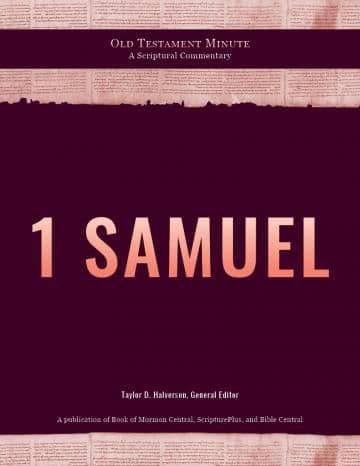Book
10 Chapters

The war between the Israelites and the Philistines represented a conflict between worshipping Jehovah, who had promised this land to Abraham’s descendants, and worshipping false gods. The central question of the war was whether the Lord would prevail through His people or idolatry would take over. The outcome depended on whether the Israelites followed the Lord or rejected Him to follow false gods.
The people had already rejected the Lord as their King when they asked Samuel to appoint a human king to rule over them in order to “be like all the nations; and that our king may . . . fight our battles” (1 Samuel 8:20). Now, with Saul as their human warrior king (instead of God as their Divine Warrior) in the battle with the Philistines at Michmash, the Israelites once again showed that they did not trust the Lord.
The phrase “in a strait” means that the people found themselves in trouble and were afraid of the Philistine army. Saul and his army were forced to retreat. Only a few of the army remained with Saul.
Instead of waiting to hear what the Lord wanted him to do through the prophet Samuel, Saul disobeyed the Lord and tried to influence Him by offering a sacrifice. This is the first time Saul disobeyed the Lord’s commandment. Later in the narrative, in chapter 15, Samuel will again condemn Saul’s disobedience with the famous passage “Behold, to obey is better than sacrifice, and to hearken than the fat of rams” (1 Samuel 15:22).
Saul had not waited for the appointed time and had acted without the Lord’s direction through Samuel. Worse, Saul blamed his actions on the people and, in the pride of his heart, sought to be honored with a monument to his own memory (see 1 Samuel 15:12). True and righteous leaders take responsibility for their own actions and for the people they lead. True and righteous leaders seek to glorify God and not themselves. Because of his transgression, Saul lost his authority as a king and would eventually lose his kingdom to David.
Samuel, for his part, learned that his office of prophet included the need to monitor and correct disobedient kings as well as the Israelites in general. Samuel’s action set the precedent for future prophets to be the outspoken conscience of the kings of the people. He knew that the unrighteous act of a king could bring the Lord’s judgment against a whole nation.
Mosiah in the Book of Mormon also noted the imperative to judge justly and the problem with unrighteous kings. In his final letter to his people, he instructed:
Now it is better that a man should be judged of God than of man, for the judgments of God are always just, but the judgments of man are not always just. Therefore, if it were possible that you could have just men to be your kings, who would establish the laws of God, and judge this people according to his commandments, yea, if ye could have men for your kings who would do even as my father Benjamin did for this people—I say unto you, if this could always be the case then it would be expedient that ye should always have kings to rule over you. (Mosiah 29:12–13)
The Philistines had cut off the supply of weapons to the Israelites. In turn, the Israelites had to enter Philistine territory to find a smith to sharpen the tools they used to grow crops. Not having the ability to produce or maintain weapons put the Israelites at a military and technological disadvantage. However, God did ask the people to trust in Him as the Divine Warrior.
Items in the BMC Archive are made publicly available for non-commercial, private use. Inclusion within the BMC Archive does not imply endorsement. Items do not represent the official views of The Church of Jesus Christ of Latter-day Saints or of Book of Mormon Central.